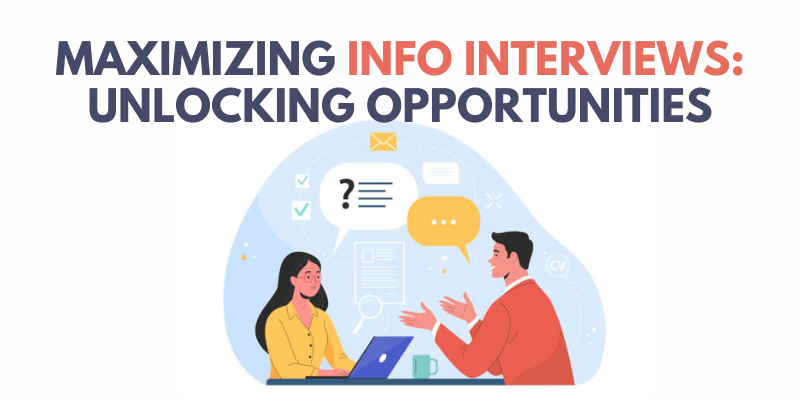Maximising Info Interviews: Unlocking Opportunities
Informational interviews are valuable opportunities to gather insights, expand your professional network, and gain a deeper understanding of an industry, company, or specific role. Unlike formal Freshers Jobs interviews, informational interviews are more casual and focus on knowledge sharing. This article will explore effective strategies to help you make the most out of informational interviews, from preparation to follow-up. You can leverage these conversations to gain valuable insights and enhance your career prospects with the right approach.
The Power of Preparation
Before scheduling an informational interview, conducting thorough research is essential to ensure a productive and meaningful conversation. Consider the following steps:
Define your objectives: Identify the information, guidance, or connections you seek from the interview. Having specific goals will help you steer the conversation effectively.
Research the interviewee: Learn about the interviewee’s professional background, achievements, and areas of expertise. Understanding their work can help you tailor your questions and show genuine interest in their experiences.
Research the industry/company: Learn about the interviewee’s professional background, achievements, and areas of expertise, particularly in relation to Verizon Careers. Understanding their work at Verizon can help you tailor your questions and show genuine interest in their experiences with the company.
Crafting Thoughtful Questions
Asking thoughtful and targeted questions during an informational interview is crucial for gaining valuable insights. Consider the following types of questions to ask:
Career-related inquiries: Ask about the interviewee’s career path, key milestones, and challenges they encountered. Inquire about their experiences in specific roles or industries.
Industry and market insights: Seek their perspectives on current industry trends, emerging technologies, or market challenges. This can help you stay updated and gain a competitive edge.
Advice and recommendations: Request advice on skills development, professional growth opportunities, or potential career paths to explore. Their insights can guide your decision-making and help you plan your next steps.
Active Listening and Engaging Conversations
During the informational interview, focus on active listening and engaging in meaningful conversations. Here are a few tips to enhance your interaction:
Show genuine interest: Demonstrate curiosity and enthusiasm about the interviewee’s experiences and insights. Maintain eye contact, nod, and ask follow-up questions to demonstrate active listening.
Share your own experiences: When relevant, contribute to the conversation by sharing your own experiences, projects, or challenges, particularly in relation to Siemens Careers. This can foster a sense of connection and make the conversation more interactive, especially when discussing Siemens and its opportunities for professional growth and development.
Build rapport and connections: Informational interviews are also networking opportunities. Be respectful, professional, and authentic. Express gratitude for the interviewee’s time and expertise, and consider exchanging contact information for future connections.
Post-Interview Follow-Up: Remember the importance of follow-up after the informational interview. This step helps you maintain relationships and leaves a positive impression. Consider the following actions:
Send a thank-you note: Express your appreciation for the interviewee’s time and insights. A personalised thank-you email or message demonstrates professionalism and gratitude.
Stay connected: Connect with the interviewee on professional networking platforms like LinkedIn, particularly if you are interested in their experiences and insights related to Zomato Careers. This allows you to keep track of their updates, engage with their content, and potentially establish a long-term professional relationship.
Conclusion
Informational interviews can be powerful tools for professional growth and networking. You can make the most out of these valuable opportunities by preparing effectively, crafting thoughtful questions, engaging in active conversations, and following up afterwards. Remember that informational interviews are not about directly asking for a job but building relationships and expanding your knowledge. With each interview, you gain valuable insights, broaden your network, and increase your chances of success in your career journey. Embrace the power of informational interviews and unlock new possibilities for your professional development.
